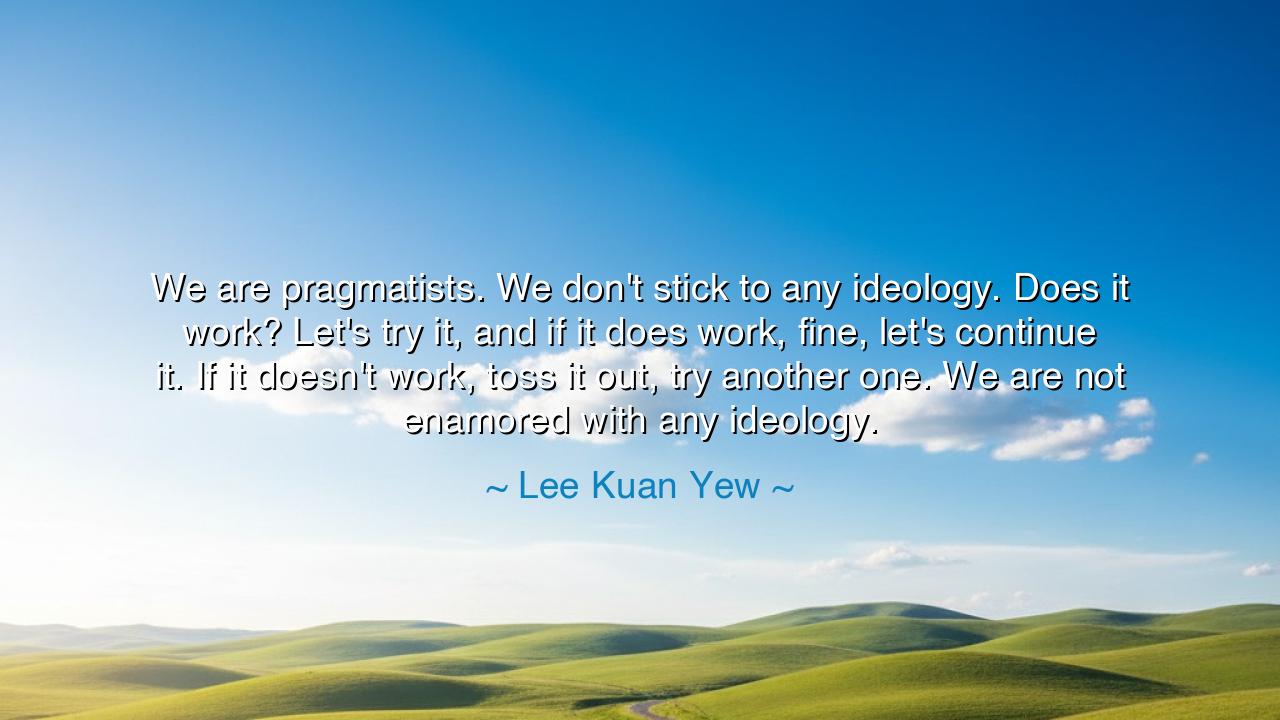
We are pragmatists. We don't stick to any ideology. Does it
We are pragmatists. We don't stick to any ideology. Does it work? Let's try it, and if it does work, fine, let's continue it. If it doesn't work, toss it out, try another one. We are not enamored with any ideology.






In the realm of governance and human endeavor, wisdom often comes not from rigid beliefs but from careful observation and trial. Lee Kuan Yew speaks with clarity and authority when he declares, “We are pragmatists. We don’t stick to any ideology. Does it work? Let’s try it, and if it does work, fine, let’s continue it. If it doesn’t work, toss it out, try another one.” These words reveal a timeless truth: that the highest aim of leadership is not adherence to doctrine, but the pursuit of results that serve the people and the greater good.
To be a pragmatist is to embrace the world as it is, rather than as one wishes it to be. Ideologies, while alluring in their clarity, can blind those who hold them too tightly. Lee Kuan Yew’s philosophy teaches that no belief is sacred if it hinders progress or well-being. Like the ancient architects who tested the strength of each stone before placing it in the temple, so too must leaders and thinkers measure each idea by its efficacy, discarding what falters and building upon what endures.
The focus on what works emphasizes action over rhetoric. In this vision, governance is a living art, responsive to the needs of the people and the shifting currents of reality. A policy or strategy is not preserved for pride or tradition, but for its tangible results. This approach is a testament to humility, for it admits that even the wisest may err, and that success is found not in stubbornness, but in adaptability and continuous learning.
The origin of such wisdom is ancient and universal. From the scholars of the classical world to the generals of old empires, those who thrived understood that clinging blindly to ideology leads to ruin. The wise measured their actions against results, adjusting their methods like skilled navigators correcting their course upon the stars. Lee Kuan Yew’s words echo this enduring principle, demonstrating that true leadership is rooted in observation, trial, and the courage to change when circumstances demand it.
Thus, let this teaching endure for all generations: pursue what works, honor the evidence of reality over the comfort of dogma, and be willing to discard what fails. To be free from attachment to ideology is to see the world with clarity, to act with purpose, and to lead with effectiveness. In this pragmatism lies the power to build enduring societies and leave a legacy that transcends the limitations of rigid belief.






LLinhvo
The idea of not adhering to a single ideology and being open to trial and error is appealing in theory, but what happens when there’s no clear guiding principle? In the long run, wouldn’t this lead to inconsistent policies that confuse the public? Is there a danger in being too flexible, where people stop trusting the system altogether? How do you make sure that pragmatism doesn’t lead to a lack of coherent vision for the future?
MDNguyen Minh Duy
Lee Kuan Yew’s pragmatic approach seems very effective in terms of adaptability and solving practical problems. Yet, I wonder about the emotional or cultural implications of abandoning ideologies. Could a society’s identity and values suffer if they constantly abandon beliefs that don't work? How does a pragmatic approach handle the deeper, more emotional aspects of society, such as tradition or cultural norms?
QMQuan Manh
This quote by Lee Kuan Yew highlights a very practical mindset—evaluate ideas based on their effectiveness rather than their ideological purity. However, does this mean that society should be willing to sacrifice ideological values for pragmatism? If a decision works in the short-term but contradicts long-term ideals, is it worth it? Can pragmatism truly work without a guiding philosophy or moral framework?
TDCam Tu Do
I really appreciate Lee Kuan Yew’s pragmatic approach. It sounds like he values results over theoretical perfection, which is something more leaders should adopt. But is there a risk that continuously tossing out policies that don't work could lead to instability? How do you balance constant experimentation with maintaining consistency and long-term vision? I wonder if this method works best in a country that is still developing like Singapore was during his tenure.
GDGold D.dragon
Lee Kuan Yew’s approach to governance is very refreshing. It suggests a focus on practicality over ideology, which is crucial in addressing the real-world challenges. I find this perspective liberating because it emphasizes solutions over rigid dogmas. Do you think this approach might be difficult to apply in societies where political ideologies are deeply entrenched? Would people accept a 'trial-and-error' method in areas beyond governance, like education or healthcare?